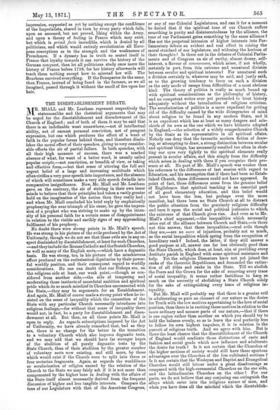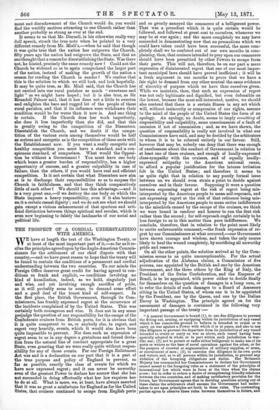THE DISESTABLISHMENT DEBATE.
1V[R. MULL and Mr. Leathern represent respectively the statesmanlike and the rhetorical arguments that may be urged for the disestablishment and disendowment of the
Church of England ; and of both of them it may be said that there is an indefinable want somewhere,—not of intellectual ability, not of earnest personal conviction, not of pungent expression, but one which produces the effect of a want of faith in the popular forces behind them, and therefore dimin- ishes the moral effect of their speeches, giving to very consider- able efforts the air of partial failure. In both speeches, with all their high measure of success, there was a marked absence of what, for want of a better word, is usually called popular weight,—not conviction, or breadth of view, or taking and effective form,—but that sense of uttering the full and urgent belief of a large and increasing multitude which oftenvivifies a very poor speech into importance, and the absence of which will sometimes make a very able speech dwindle into comparative insignificance. Now, Mr. Miall and Mr. Leatham gave, on the contrary, the air of striving in their own inner minds to believe that their principles had taken a vastly greater hold on the imagination of the nation than they really had ; and when Mr. Miall concluded his brief reply by emphatically prophesying the near triumph of his cause, he gave the impres- sion of a prophet who was striving to make up by the inten- sity of his personal faith for a certain sense of disappointment in relation to the visible and earthly signs of any approaching fulfilment of his prophecy. No doubt there were strong points in Mr. Miall's speech. Ile was strong in his picture of the evils produced by the Act of Uniformity, though we do not see that these evils are in any re- spect diminished by disestablishment, at least for such Churches, —and theyindude the Roman Catholic and the Scotch Churches, as well as many of the English sects,—which have a dogmatic basis. He was strong, too, in his picture of the mischievous effect produced on the ecclesiastical dignitaries by their power- ful worldly position, and their consequent regard to worldly considerations. No one can doubt that our Bishops are, on the religious side at least, our weak point,—though as con- sidered from another side,—the side of tempering and moderating those instincts of sacerdotal ambition and spiritual pride which do so much mischief in Churches unconnected with the State,—they may be arguments for an Establishment.
And again, Mr. Miall of course made a strong point when he in- sisted on the sense of inequality which the connection of the State with any particular Church necessarily introduces into religious feelings,—for without that sense of inequality there would not, in fact, be a party for disestablishment and disen- dowment at all. But then, on all these points Mr. Miall is open to reply. As regards subscriptions imposed by the Act of Uniformity, we have already remarked that, bad as they are, there is no change for the better in the transition to a voluntary Church which also imposes dogmatic tests, and we may add that we should have far stronger hopes of the abolition of all purely dogmatic tests by the State Church, than of their abolition by the greater number of voluntary sects now existing, and still more, by those which would exist if the Church were to split into three or four sectarian fragments. Again, as regards the worldliness or secularization of religion caused by the relation of the Church to the State we may fairly ask if it is not more than compensated by the higher tone in dealing with the affairs of the State itself almost necessarily derived from the frequent discussion of higher and less tangible interests. Compare the tone of our Legislature with that of the American Congress, or any of our Colonial Legislatures, and can it for a moment be denied that if the spiritual tone of our Church suffers
something in purity and disinterestedness by the affiance, the tone of our Parliament gains something by the same alliance? Has not the perpetual intrusion of higher interests into Par- liamentary debate an evident and real effect in raising the moral standard of our legislators, and widening the horizon of their thoughts ? Is there not in the debates of Colonial Parlia- ments and of Congress an air of earthy, almost drossy, self- interest, a flavour of commonness, which arises, if not wholly, certainly in part, from this extreme and unnatural division between secular and spiritual interests? For unnatural such a division certainly is, whatever may be said, and justly said, as to the growing tendency to force on such a division as the only mode of escape from difficulties of a most obvious kind. The theory of politics is really as much bound up with spiritual considerations as the philosophy of history, and no competent writer ever yet pretended to treat history adequately without the introduction of religious criticism. The secularization of politics is a mere expedient for getting rid of the difficulty caused by the wide divergencies of mind about religion to be found in any modern State, and it is an expedient which has at least as many dangers and mis- chiefs of its own as the one which we have hitherto adopted in England,—the selection of a widely comprehensive Church by the State as its representative in all spiritual affairs. Nobody can deny that the favourite modern fiction of draw- ing, or attempting to draw, a strong distinction between secular and spiritual things, has necessarily resulted too often in shut- ting our eyes very tightly to the spiritual elements really present in secular affairs, and this simply from the difficulty which arises in dealing with them if you recognize their pre- sence at all. No part of Mr. Miall's speech was weaker than his reference to the differences of last session with regard to Education, and his assumption that if there had been no Estab- lished Church, those differences could not have appeared. In point of fact, those differences arose from the genuine belief of Englishmen that spiritual teaching is an essential part of all good elementary education, and this belief would not have been the less, but perhaps even the more manifest, had there been no State Church at all to distract the public attention from the genuinely religious difficulty and turn it upon the social and political jealousies to which. the existence of that Church gives rise. And even as to Mr. Miall's chief argument,—the inequalities which necessarily arise out of the alliance between Church and State,—is there not this answer, that these inequalities,—real evils though they are,—are no more of injustices, probably not so much, as the social inequalities which spring from the recognition of hereditary rank? Indeed, the latter, if they still answer a. good purpose at all, answer one far less obviously good than the State Church, which does, at least, aim at providing every destitute parish in England with some spiritual assistance and help. Yet the religious Dissenters have not yet joined the ranks of the theoretic Republicans, and demanded the extinc- tion of all titles and ranks in the State. Till we abolish the Peers and the Crown for the sake of removing every trace of social inequality, it seems rather fastidious to harp so. much on the necessity of abolishing a State Church solely for the sake of extinguishing every trace of religious in- equality.
But Mr. Miall will probably say that there is a greater evil in adulterating so pure an element of our nature as the desire for Truth with the low motives appertaining to the love of social position, than there is in exciting these motives in relation to the more ordinary and meaner parts of our nature,—that if there is one region rather than another on which you should try to hold the balance evenly, so as to leave the soul perfectly free to follow its own highest impulses, it is in relation to the pursuit of religious truth. And we agree with him. But is
there the least chance that the disestablishment of the Church of England would eradicate those distinctions of caste and
fashion and social grade which now influence and adulterate the desire for truth? Is it not certain that the Churches of the higher sections of society would still have these spurious advantages over the Churches of the less cultivated sections? Is it not certain that the Wesleyan and Baptist and Evangelical Churches would still labour under a great disadvantage as compared with the high-ceremonial Churches on the one side,
and the latitudinarian Churches on the other ? For our parts, we do not believe that any conjuring can extinguish the alloys which enter into the religious nature of man, and when you have done all the mischief which the disestablish-
ment and disendowment of the Church would do, you would find the worldly motives attracting to one Church rather than another probably as strong as ever at the end.
It seems to us that Mr. Disraeli, in his otherwise really very dull speech, struck the true note when he pointed to a very different remedy from Mr. Miall's,—when he said that though it was quite true that the nation has outgrown the Church, fifty years ago the nation had outgrown the State, and that no one thought that a reason for disestablishing the State. Was there not, he hinted, precisely the same remedy now ? Could not the Church be widened so as to again comprehend the larger part of the nation, instead of making the growth of the nation a reason for rending the Church in sunder ? We confess that this is the solution to which we still look, and look hopefully. It may be quite true, as Mr. Miall said, that the Church has not carried into our rural parishes as much "sweetness and light" as we might have hoped ; but it is also true, as Sir Bounden Palmer said, that it has done not a little to sweeten and enlighten the bare and rugged lot of the people of those rural parishes, and that if its influence were withdrawn their condition would be far worse than it now is. And one thing is certain. If the Church does her work imperfectly, she does it less imperfectly than she did, and that this is greatly owing to the competition of the Dissenters. Disestablish the Church, and we doubt if the compe- tition of the various sects among themselves would be half as serious and energetic as is the competition of these sects with the Establishment now. If you want a really energetic and healthy competition you must have a standard, and a con- spicuous standard, of comparison. What would the Opposi- tion be without a Government ? You must have one body which bears a greater burden of responsibility, has a higher opportunity of success, and a greater culpability in ease of failure, than the others, if you would have real and efficient competition. Is it not certain that what Dissenters now aim at is to discharge their responsibilities so as to surpass the Church in faithfulness, and that they think comparatively little of each other ? We should lose this advantage,—and it is a very great one,—if we destroy the one body on which the State imposes a heavy responsibility, even if it also bestows on it a certain casual dignity ; and we do not see what we should gain except a vicious enhancement of that spurious and arti- ficial distinction between things spiritual and secular, which is even now beginning to falsify the landmarks of our social and political life.



































 Previous page
Previous page